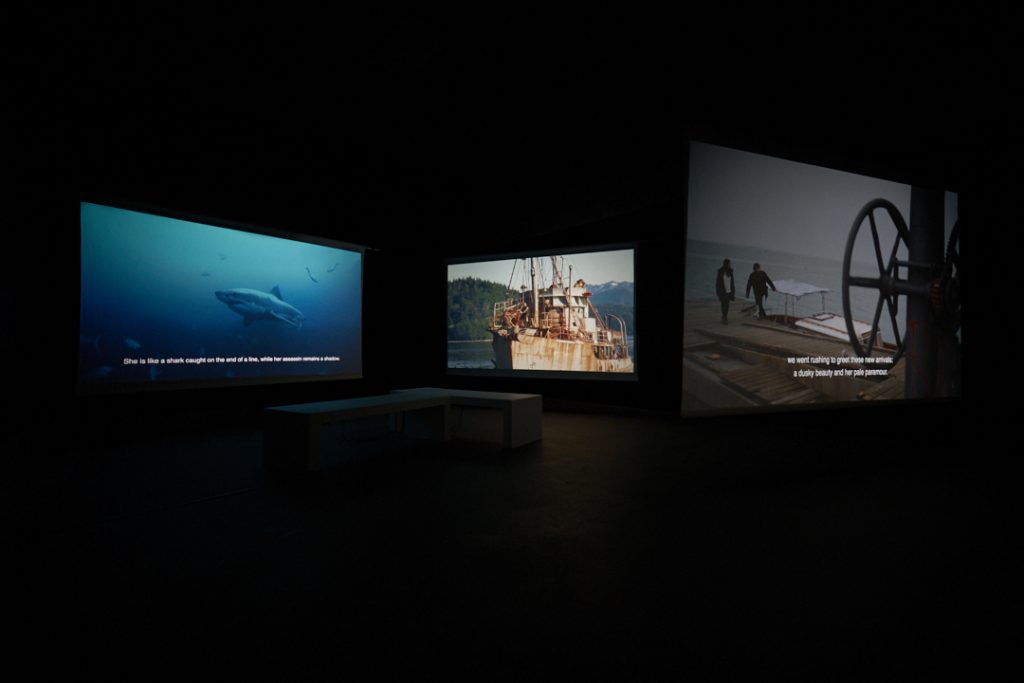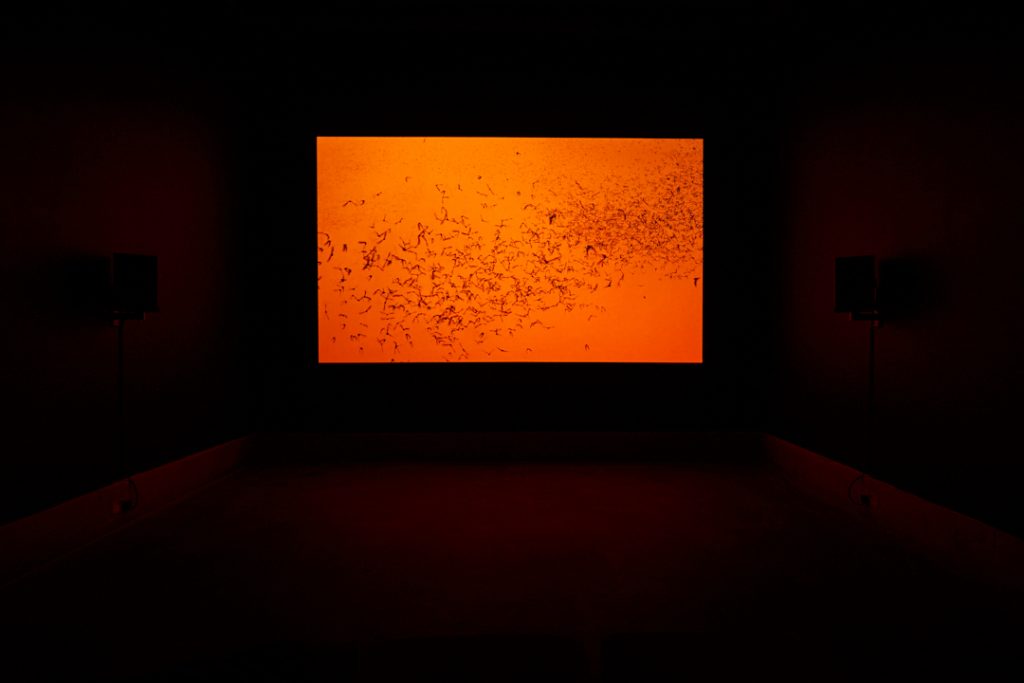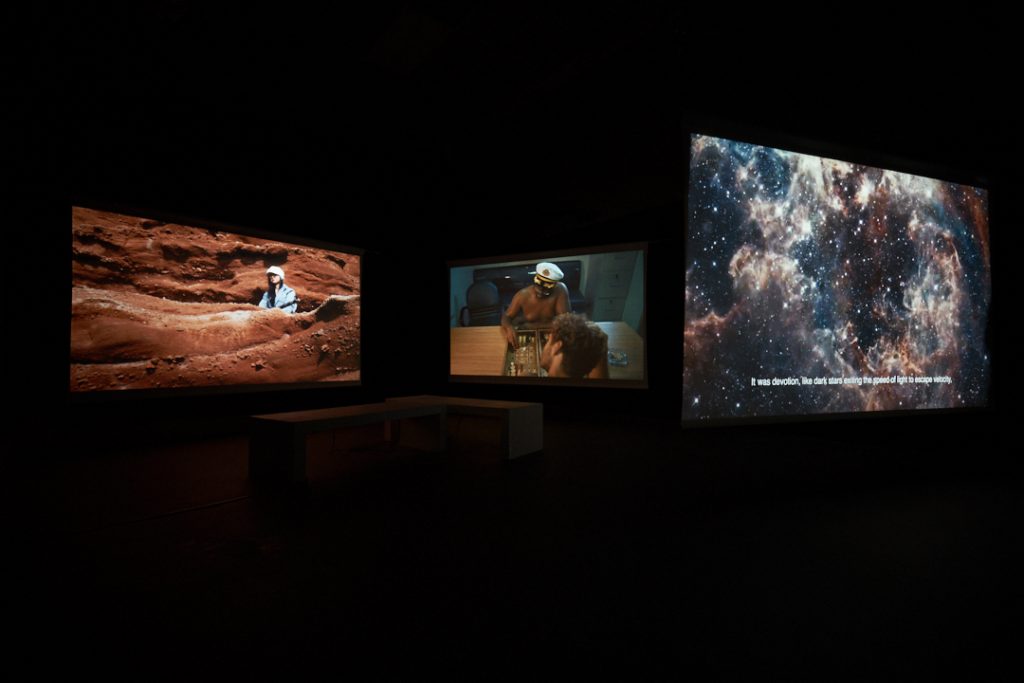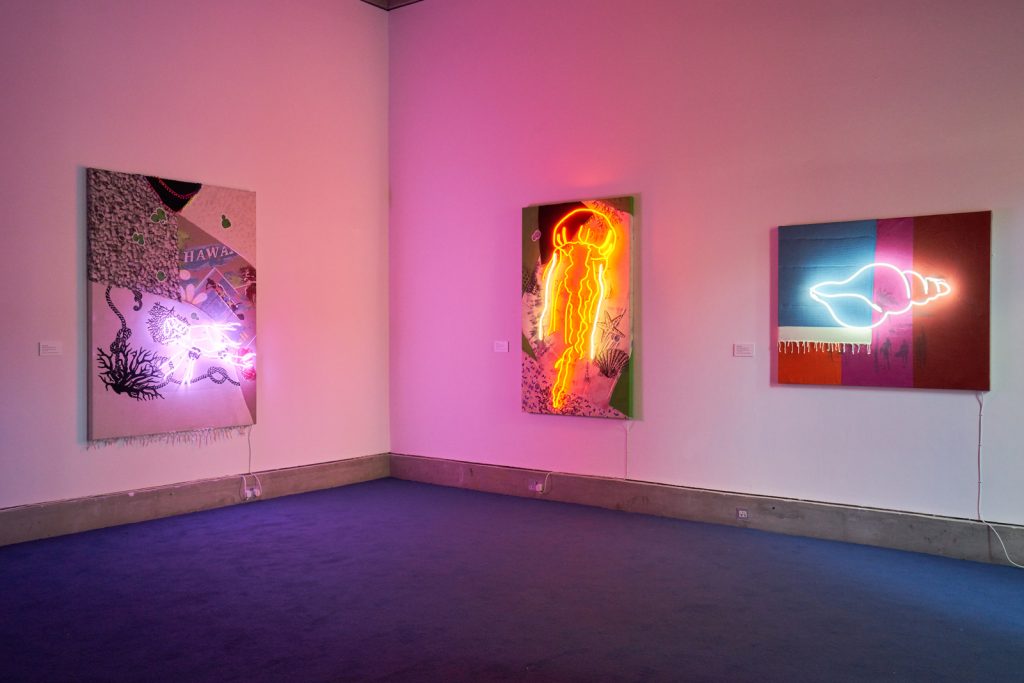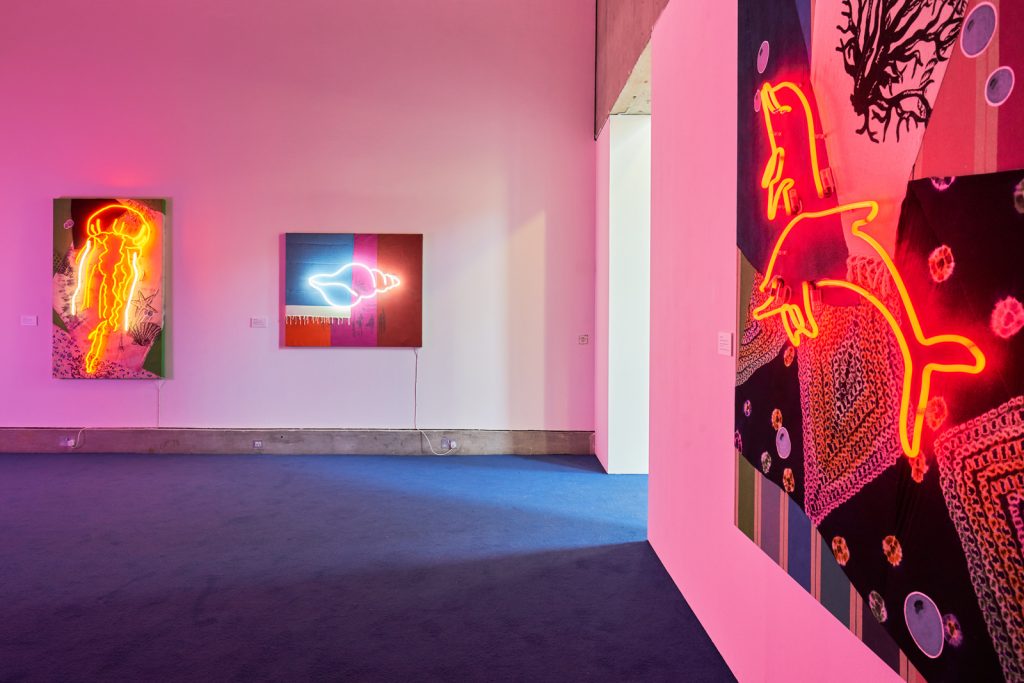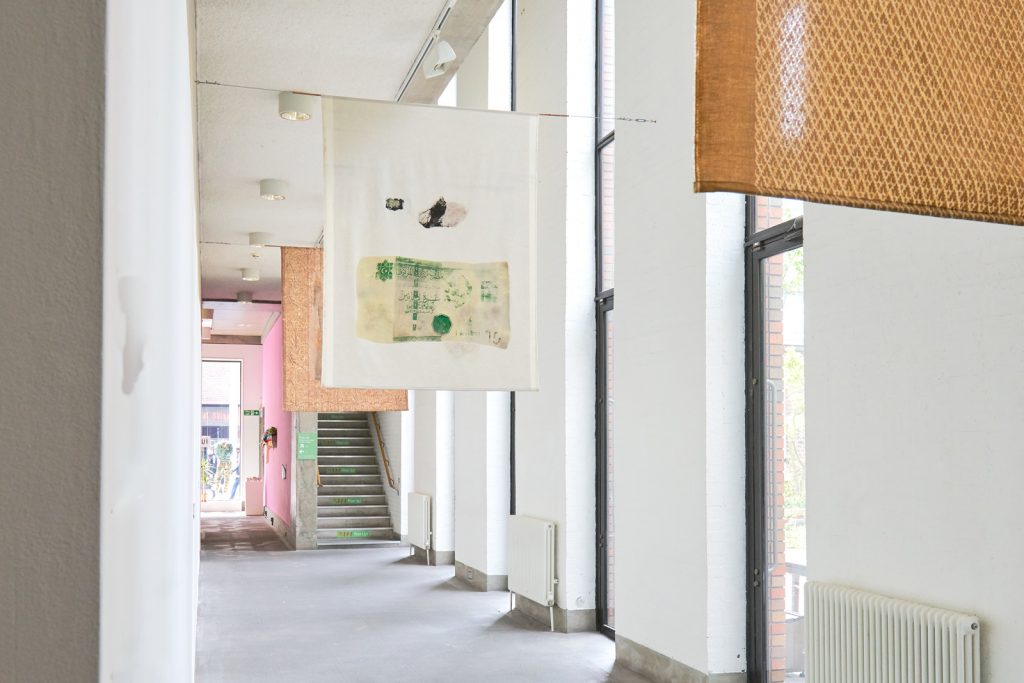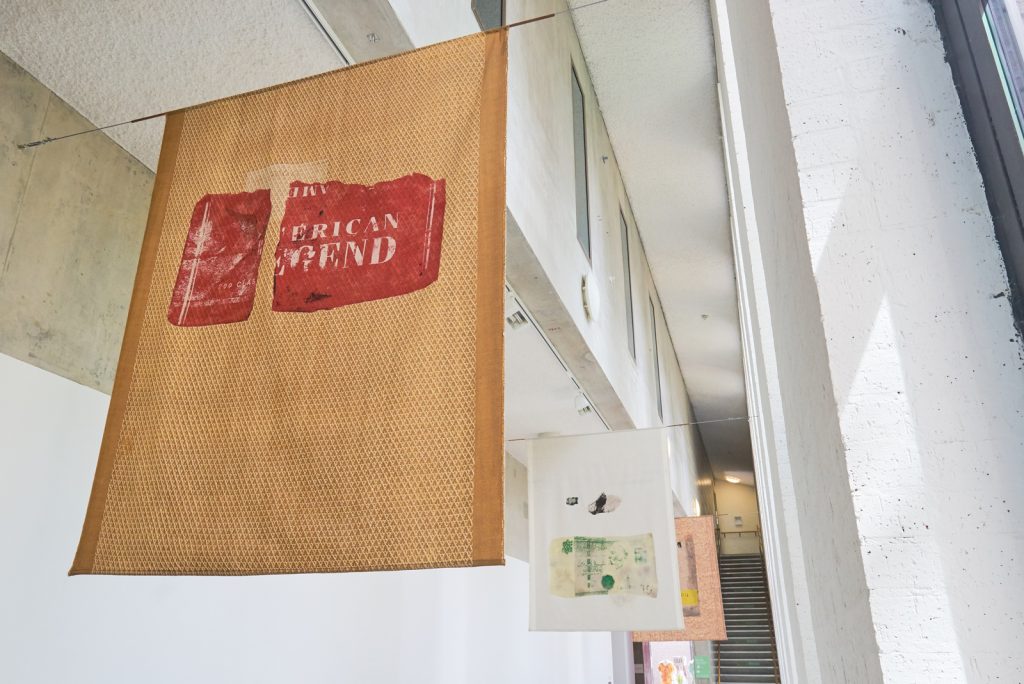Exhibition
Shezad Dawood’s epic film series Leviathan comes to the gallery, alongside a number of textiles and neon works. Taking inspiration from both Thomas Hobbes’ book Leviathan and the biblical sea monster of the same name, Dawood’s Leviathan follows the migratory patterns of people between Europe and Africa, who are often making the crossing as refugees. The film explores the connection between mass migration and marine conservation, in particular how the turbulent journeys made by human migrants mirror the tumultuous ecological changes in the sea over which they travel.
This timely exhibition combines the themes of marine biology, climate change, political systems and mental health, to show how human activity and marine ecologies are intertwined. The exhibition also features a new interactive virtual reality work which explores what the future may hold for marine biology, in a world heavily affected by climate change.
Dawood intends Leviathan to eventually consist of ten film ‘chapters’, and Bluecoat will exhibit the first five chapters in the series, making it the most complete UK presentation ofthe work to date. The presentation will also include the UK premiere of chapters four and five. The first two chapters of Leviathan premiered at Venice in conjunction with the 57th Art Biennale. The work has developed, been adapted and grown across exhibitions and screenings in Wales, Netherlands and Italy before reaching Bluecoat for this major exhibition charting Dawood’s ambitious project. The series is slated for completion in 2020.
Public Programme
To accompany Shezad Dawood’s Leviathan exhibition at Bluecoat we’re hosting two symposia on the themes of ‘Empathy In and Out of Species’ and ‘Methods for Surviving the Future’, which featured a series of discussions between scientists and academics to present their work in response to the core themes of the exhibition.
Symposium: Empathy In & Out of Species
25 September 2019
Professor Alex Balch (University of Liverpool), PhD student Samantha Hook (University of Manchester) and Jennifer Verson (Director of Migrant Artists Mutual Aid), will explore empathy in connection with human migration and our relationship with marine species. A discussion moderated by Inês Geraldes Cardoso will follow participants’ presentations.
moral bargains: slavery, hospitality &
immigration today
A talk by Professor Alex Balch
In this presentation Alex Balch will ask why and with what effects the moral/rhetorical power of anti-slavery has moved to the centre of political debates over immigration. It will draw on evidence from the UK and US to argue that a new ‘grand bargain’ over immigration in liberal democracies can be traced to older ideas about slavery and hospitality.
Click here to watch the individual presentation.
more than jaws: empathy & shark extinction
A talk by Samantha Hook
Charting the journey of sharks and rays through time and across geographies, Samantha Hook introduces us to this group’s fantastic resilience despite multiple threats of mass extinction, and addresses its contemporary struggles for survival in the face of severe overfishing, climate changes and the chronic lack of human empathy toward the apex predator of the sea.
Click here to watch the individual presentation.
migration songs: memory, proximity and micro political engagement
A talk by Jennifer Verson
In her talk, Jennifer Verson will draw on the artistic and political work of Migrant Artists Mutual Aid (MaMa) to explore new models for peacebuilding and social repair. Weaving together Memory Studies, Peacebuilding and Performance, she will share some of MaMa’s new work interpreting the archives and exhibits from the International Slavery Museum into new music.
Click here to watch the individual presentation.
Symposium: Methods for Surviving the Future
2 October 2019
Professor Lars Schmeink (HafenCity University Hamburg) and Nicole Prandi (PhD candidate at Manchester University) explore how we might adapt to the future, discussing possible life-saving algae, inclusive activism, and changing notions about what it means to be human. A discussion moderated by Inês Geraldes Cardoso will follow participants’ presentations.
blue-green: life-saving algae on the blue planet
A talk by Nicole Prandi
For over 1 billion years cyanobacteria has helped shape the Earth’s atmosphere and life as we know them. Now the algae may be able to help us survive climate change. From carbon neutral biofuels to bioplastic and living buildings, Nicole Prandi will chart the unexpected applications of photosynthetic bacteria for surviving now and in the future on our Blue Planet.
Click here to watch the individual presentation.
biopunk: survival in the anthropocene
A talk by Professor Lars Schmeink
Biopunk is a science fictional mode which explores the societal effects of biotechnology and genetic engineering – a cultural expression all the more relevant, given the radical changes transforming our world. Climate change and the depletion of natural resources will push human existence to the brink in the foreseeable future, and biotechnology promises to be one possible way out by gesturing towards a posthuman existence. This talk by Lars Schmeink explores these posthuman modes of survival and why that might not include the human after all.
Click here to watch the individual presentation.
Contributors
Professor Lars Schmeink
Dr Lars Schmeink is a cultural and media scholar working on science fiction and posthumanism in contemporary culture. He has written extensively on ‘biopunk’, a form of science fiction exploring the societal effects of biotechnology and genetic engineering. Dr Schmeink is the project lead for ‘Science Fiction’ in the ‘FutureWork’ initiative funded by the German Federal Ministry of Education and Research. He is the author of Biopunk Dystopias: Genetic Engineering, Society and Science Fiction (2016, Liverpool UP), and the co-editor of Cyberpunk and Visual Culture (Routledge, 2018) and The Routledge Companion to Cyberpunk Culture (Routledge, 2020).
Professor Alex Balch
Alex joined the Department of Politics at the University of Liverpool in 2010. His research focuses on the politics and policy of immigration, and on efforts to combat forced labour and human trafficking. He has worked with a range of government and non-government organisations on research projects and regularly contributes to public debates. He is currently running a large network with partners in Africa that is funded by the Arts and Humanities Research Council as part of the Global Challenges Research Fund (GCRF). He is a member of the Centre for the Study of International Slavery (CSIS) – a joint centre run with Liverpool’s International Slavery Museum.
Samantha Hook
Samantha is a final year PhD candidate studying shark and ray genetics at the University of Manchester. Her passion and empathy for the environment began her career as a conservation biologist after her first degree, in which she worked with a range of species, including manatees in Florida! After returning and graduating with a Master of Science by Research, Samantha began working for a charity on illegal unregulated and unreported fishing activity across Europe, including investigations into mafia in Italy. During this, she was faced with the harsh reality of shark and ray overfishing. In 2015 she began her Natural Environment Research Council doctoral training program studying for her PhD, in which she has experienced both the highs and lows of shark and ray research. She has worked with multiple NGO’s as part of her research and has won awards for her results and collaborative efforts. As she nears the end of her research she is continuing to work with charities, NGO’s and fisheries to help inform and educate that sharks are more than just their jaws (or their fins!). Outside of her work, Samantha is a swimmer and scuba diver, instructing diving at her club she first learned to dive in 10 years ago
Jennifer Verson
Jennifer Verson is a Doctoral Candidate at The Centre for Trust, Peace, and Social Relations at Coventry University where she holds a United Nations Alliance of Civilizations Studentship for her research ‘Performing Peace: Applied Performance and Scriptural Reasoning as a Peacebuilding Process’. The first joint studentship represents UNAOC’s expansion of research activity in the area of intercultural dialogue and the role it plays in promoting (or inhibiting) social solidarity, trust and peaceful relations in diverse and changing societies. (UNAOC). Performing Peace is an inter-disciplinary research project that investigates the use of performance and performing arts to bring Scriptural Reasoning into the public square.
She is the founder and Artistic Director of Migrant Artists Mutual Aid (MaMa), a cross national network of women, mothers, migrants, artists, academics and activists who work together to support members who are seeking sanctuary, and campaign for justice in the migration system. She has a Masters Degree with Distinction in Cultural Performance from Bristol University. Recent publications include Migrant Artists’ Mutual Aid: A Short History in Images. Kritika Kultura, (30/31) pp.217-223 (2018). Co-editor Migrant Artists Mutual Aid: Strategies for Survival, Recipes for Resistance. Liverpool: Migrant Artists Mutual Aid (2017).
Nicole Prandi
Nicole Prandi is a PhD student in her last year at Manchester University. She holds a Bachelor’s Degree in Biology from the University of Cagliari (2013) and a Master’s Degree in Industrial Biotechnology (2015) from the University of Padua. She worked in Imperial College London (2016) on the genetic engineering of cyanobacteria (blue-green algae). Her work was focused on the sustainable production of biofuels from light and CO2 through photosynthesis. Her interests include sculpture, props making and performing arts.
